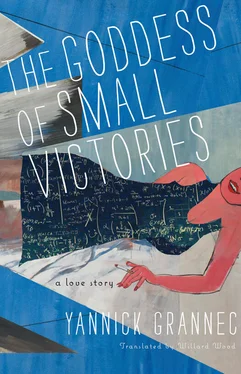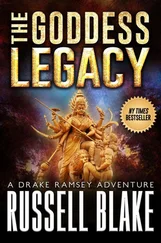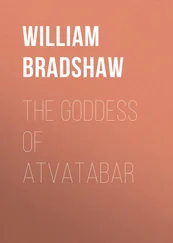“Whoever has experienced the effulgence of mathematics, the conversation of the angels, will try to gain access to that realm again. And if I have to pass for a madman, Hulbeck, so be it.”
The angel of silence and the demon of embarrassment both descended on the table in the garden. Kurt’s friends didn’t like it when he openly embraced the common verdict about him. If he kept notions of this kind to himself, they would remain socially acceptable follies. If he stated them within a framework of logic and personal belief, the label of madness might still be avoided. But when he described himself as a madman, no one could hide behind a screen of politeness.
Penny came and laid her soft head on my lap. I patted it while looking for a way to defuse the situation. Kitty, no dullard, opted for false naïveté, as does every woman accustomed to pacifying warring spirits.
“I notice a depressing corollary to this assertion. If I’m going to believe in angels, then I also have to allow for the existence of evil spirits.”
“The ancient texts tell us that there exist an infinite number of evil spirits, and only seventy-two angels. I belong under the demonic auspices of Buer, a second-class demon. He champions philosophy, logic, and the properties of medicinal plants. Second class! I’m a little put out!”
“Do you believe in the deity, Mr. Gödel?”
“Yes. I consider myself a theist.”
At that point in my life, I almost preferred the folkloric aspect of religion to the core of faith itself: I liked Mass, its pomp and ritual. Kurt had bridled somewhat when I installed a Madonna at the end of the garden. In Protestant territory, I was declaring my Catholic roots. In any case, a little decorative devoutness couldn’t hurt. My husband leafed through the Bible from his bed on Sunday mornings. His faith was no doubt more exacting than mine.
“An awkward position for a modern philosopher.”
“It all depends on whether we are talking about faith or religion. Ninety percent of philosophers today believe that the task of philosophy is to expunge religion from people’s minds.”
“From what I’ve read, Kurt, you frequented the intellectuals of the Vienna Circle. They wanted to eradicate subjectivity. Even intuition. Isn’t that ironic? In the very city that gave birth to psychoanalysis?”
“I had friends and colleagues among the logical positivists, but I never declared myself a member. And I don’t think their work can be reduced to that. Furthermore, I would prefer to remain ‘Mr. Gödel’ to you.”
Overconfident, Theolonius had crossed the yellow line. Kurt was not allergic to the potty ideas of others, but his interlocutor’s two lapses were enough to make him withdraw into his shell: his overfamiliarity, and the fact that he had studied up on Kurt’s life before meeting him.
Oppenheimer, still a little dazed from his nap, came to join us at the table.
“I don’t object to the idea of analysis. As long as it doesn’t get me into trouble!”
“There is nothing shameful about it. Our friend Pauli has been undergoing psychoanalysis for a long time. He has maintained a correspondence with Jung for years.”
Oppenheimer was patting his pockets fruitlessly in search of cigarettes. I handed him mine. Kitty, too, was out.
“I am still debating with myself over the scientific legitimacy of your profession, Charles. The psychoanalytic pantheon, after all, is not that far from the world of angels we were discussing earlier.”
Oppie was a much tougher adversary than Theolonius Jessup. Hulbeck, who was decidedly not having a good day, decided against entering into a confrontation.
“Would you tell us about Jung’s ideas?”
Gauging my ignorance from my look of puzzlement, Charles undertook to act as my professor. Most significantly, it allowed him not to lose face. He explained to me that the psychoanalyst Carl Jung held that absolute knowledge existed, that it took the form of a collective unconscious made up of archetypes accessible to the unconscious of every individual. These archetypes were themes universally found across human cultures. One can find ogres, for instance, in the fairy tales of Hans Christian Andersen as well as in the legends of India and of Papua New Guinea. There exists a vast repertoire of ideas common to all mankind, transcending individual societies or epochs. Our personal experiences provide only the seasoning to this archaic soup. I saw no difference between this and religion, except that devils and angels were expelled from heaven to make room for fairies and witches. But if I had to communicate with this extrasensory world that my husband so cherished, I much preferred it to be one that included the Madonna. The arid kingdom of mathematics had never struck me as a barrel of laughs either. Whatever these overcultivated men might say, their verbal acrobatics mainly provided an excuse for not grappling with reality.
“Collective unconscious, God, concepts … Defining the world of ideas matters very little to me. My goal is to get there. By means of the mind. By means of logical bridges. Or following intuition. My unconscious tells me which path is most charged with meaning. It considers a less censored set of possibilities and spotlights ideas that my reason would never agree to explore.”
“Then what are the criteria that your unconscious uses in judging the relevance of an idea?”
“I stick to my own discipline, Mr. Jessup. I am susceptible to a certain kind of beauty. Mathematical elegance.”
“A very subjective notion and a perfectly obscure one to nonmathematicians.”
“I am not so sure, Robert. Every person is innately drawn to simplicity, perfection. Clearness. The need for contact with immanence is universal.”
Theolonius squirmed with pleasure in his chair.
“Magnificent how everything assumes embodiment, don’t you agree? An exploration of vibratory fields, with the physical sciences and the science of the soul in harness, intent on a single quest. The ultimate quantum communion!”
Oppenheimer squashed out his cigarette under Jessup’s nose.
“Quantum mechanics studies physical phenomena on the scale of the atom and of subatomic particles. Period. While Pauli and Jung may have noted correspondences between physics and psychology, they have never equated the two disciplines. Most of the time, it’s a question of semantic bridges. Not of substantial links. But I do understand that it can be very tempting to use our vocabulary to impress the untutored.”
“Are you calling into question the principle of synchronicity?”
“Don’t turn a subjective phenomenon into a postulate. Or a theorem. Any causal link between two personal experiences remains a happenstance, even if the particular resonance it sets up within a person’s unconscious is incontrovertible.”
“That resonance is the absolute proof of a manifestation of immanence! Our drive to find meaning in an event implies the preexistence of such a meaning. Why else would nature give us the ability to question ourselves?”
“The term ‘absolute proof’ is inappropriate. And are you sure you mean ‘nature’ and not ‘culture’? Why shouldn’t we hope for meaning where there is none? It wouldn’t be the first time mankind had gone on a vain quest.”
“God has injected a maximum of meaning into the world, giving multiple values to the same events, a function on a multitude of levels.”
“If you are going to bring God into the debate, then we can have nothing more to say to each other, Gödel!”
“I’ve known you to be more spiritual, Robert. Where have you put your copy of the Mahabharata?”
“I am sometimes distrustful of these ideas, because they provide a basis for charlatanism. The thirst for meaning, which everyone feels, makes some people an easy prey. It is too easy to go from synchronicity to coincidence and premonitions, to mediums …”
Читать дальше












